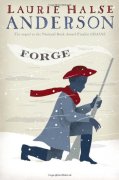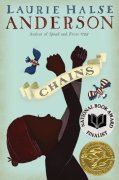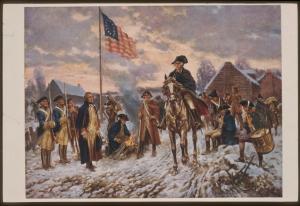
 In 2008 & 2010, author Laurie Halse Anderson released the first two historical fiction novels of the Seeds of America trilogy: Chains & Forge.
In 2008 & 2010, author Laurie Halse Anderson released the first two historical fiction novels of the Seeds of America trilogy: Chains & Forge.
Just recently (late 2016), the finale of the series–Ashes–was published to very positive reviews. As such, we here at Mackin are very fortunate to have procured some of Anderson’s musings about the process of conceiving, researching, writing, & even in some cases living ? this series-closing entry:
If you combine terrific music with American history, you find the sweet spot where I live. Yes, my friends, the songs of Hamilton play in my head around the clock. The line that pops up most often on my interior radio station comes from a song sung by George Washington in the musical: “History has its eyes on you.” History has its eyes on all of us, beseeching us to learn from the past.
I’ve had my eyes on the American Revolution for nearly twenty-five years. Back then, I had no intention of writing a trilogy, or indeed, any books at all about our war for independence. I was deep in my research for Fever 1793 and accidentally stumbled across a fact about my favorite American hero, Benjamin Franklin. I knew all about his political life, his scientific research, sense of humor, printing press and writing, of course. But no one had ever told me that Benjamin Franklin held people in slavery for his entire adult life.
 I was so startled by this fact that I went into the archives for primary sources to prove that it was true. The evidence is irrefutable; we have his letters, tax documentation, and more that proves his slave-holding and gives us the names of some of the people whom he held in bondage: Joseph, Jemima, Peter, King, Othello, George, Bob, along with two unnamed children, one of whom died in the smallpox epidemic of 1756.*
I was so startled by this fact that I went into the archives for primary sources to prove that it was true. The evidence is irrefutable; we have his letters, tax documentation, and more that proves his slave-holding and gives us the names of some of the people whom he held in bondage: Joseph, Jemima, Peter, King, Othello, George, Bob, along with two unnamed children, one of whom died in the smallpox epidemic of 1756.*
The story of their lives plunged me into decades of eye-opening research. I learned that slavery was commonplace in the North and the South at the time of the American Revolution, that most of the Founding Fathers held families in bondage, and that many enslaved Americans fought for the Patriot or British armies, just as free Americans did. America – the beacon of freedom for the world – was built on the backs of enslaved American families. This horrifying truth has been kept from our history books and national conversation for too long.
While my research is always grounded in primary source documents and academic scholarship, I found I had to go further to be able to share the world of the 18th-century with my readers. For the writing of Chains and Forge, I cooked rabbit over an open fire in a forest, wrote by candlelight with a bottle of ink and a goose quill sharpened by a penknife, and went walking in my stocking feet over frozen snow like the soldiers of Valley Forge.
 For the writing of Ashes, I dug even deeper. I became an expert on Colonial rattlesnake encounters, the loading of muskets, and the taste of roasted possum. I kissed my washing machine and dryer after learning what women had to do to clean clothes in the 18th century. I read the letters of star-crossed lovers, angry generals, and cranky Congressman. I unearthed military records and personal journals, studied the uses of willow bark tea, and was gobsmacked by the toileting habits of the Continental Army during the siege of Yorktown. I shuddered with horror at the fate of smallpox victims driven out of York by the British. I marveled at the courage of the American and French soldiers who dug trenches while being shot at by British artillery. Last, but not least, I reveled in the language of the late 18th-century; phrases like an addlepated lackwit, muzzy-headed blatherskite, skulking varlets. (For the record, these are now the curses that I shout at bad drivers.)
For the writing of Ashes, I dug even deeper. I became an expert on Colonial rattlesnake encounters, the loading of muskets, and the taste of roasted possum. I kissed my washing machine and dryer after learning what women had to do to clean clothes in the 18th century. I read the letters of star-crossed lovers, angry generals, and cranky Congressman. I unearthed military records and personal journals, studied the uses of willow bark tea, and was gobsmacked by the toileting habits of the Continental Army during the siege of Yorktown. I shuddered with horror at the fate of smallpox victims driven out of York by the British. I marveled at the courage of the American and French soldiers who dug trenches while being shot at by British artillery. Last, but not least, I reveled in the language of the late 18th-century; phrases like an addlepated lackwit, muzzy-headed blatherskite, skulking varlets. (For the record, these are now the curses that I shout at bad drivers.)
The chaos of the American Revolution provided tens of thousands of enslaved Americans with the opportunity to liberate themselves. Some historians believe as many people freed themselves during the Revolution as did during the years of the Underground Railroad. I decided to set Ashes in the Southern campaign theater, in order to bring to life the perilous journey for freedom undertaken by countless heroic Americans.
 Once I understood the facts of what had happened in 1781, it was time to give the story a beating heart. I had to figure out how my fictional characters – Isabel, Curzon, and Ruth – could fit into the real world of long ago. The details of people’s lives were different back then, of course, but some things never change. Teenagers fall in love, they care about their friends, they make mistakes, and they try to make amends. Sometimes ‘family’ describes the people you are related to by blood and sometimes it’s the people you are related to by spirit. I set about weaving their story of love, survival, and freedom into the larger narrative of America’s struggle for independence.
Once I understood the facts of what had happened in 1781, it was time to give the story a beating heart. I had to figure out how my fictional characters – Isabel, Curzon, and Ruth – could fit into the real world of long ago. The details of people’s lives were different back then, of course, but some things never change. Teenagers fall in love, they care about their friends, they make mistakes, and they try to make amends. Sometimes ‘family’ describes the people you are related to by blood and sometimes it’s the people you are related to by spirit. I set about weaving their story of love, survival, and freedom into the larger narrative of America’s struggle for independence.
Well-written and researched historical fiction brings history to life in a way that even the best textbook can’t. Human beings are wired to gravitate to stories about people, not about obscure dates or battle names. Framing the lives of interesting characters within the context of historical events makes it much easier to remember and to understand the history. As well as enjoy a great book!
The most valuable history lessons teach us how we got to where we are today, and how we can do better in the days to come. I’m proud to see the Seeds of America trilogy being embraced by Social Studies as well as Language Arts teachers across the country. Our children deserve the harsh truths about our founding as well as the glorious ones. Their understanding of the contributions made by African Americans during the Revolution will open the necessary conversations about how America reached its current state of racial injustice.
Decades of studying our nation’s founding have given me a profound appreciation of the sacrifices made by the Americans who had to fight for their personal freedom, as well as that of their new nation. Their example of intelligence, perseverance, faith, and community is one that we all should honor, respect, and learn from.
 * Nash, Gary B., “Franklin and Slavery,” Proceedings of the American Philosophical Society, Vol. 150 No. 4, Dec 2006.
* Nash, Gary B., “Franklin and Slavery,” Proceedings of the American Philosophical Society, Vol. 150 No. 4, Dec 2006.
About the Author: Laurie Halse Anderson is the New York Times-bestselling author who writes for kids of all ages. Known for tackling tough subjects with humor and sensitivity, her work has earned numerous national and state awards, as well as international recognition. Two of her books, Speak and Chains, were National Book Award finalists. Laurie was honored with the 2009 Margaret A. Edwards Award given by YALSA division of the American Library Association for her “significant and lasting contribution to young adult literature…”. Mother of four and wife of one, Laurie lives in Northern New York, where she likes to watch the snow fall as she writes.






